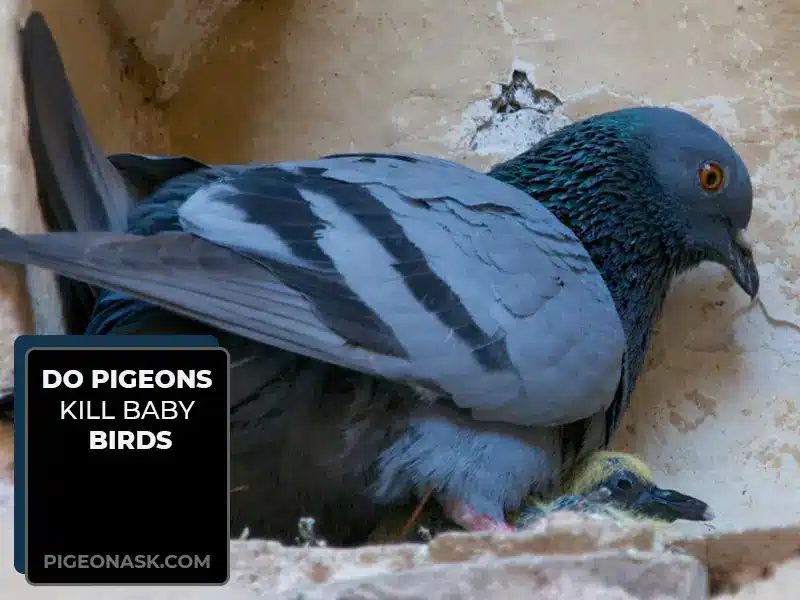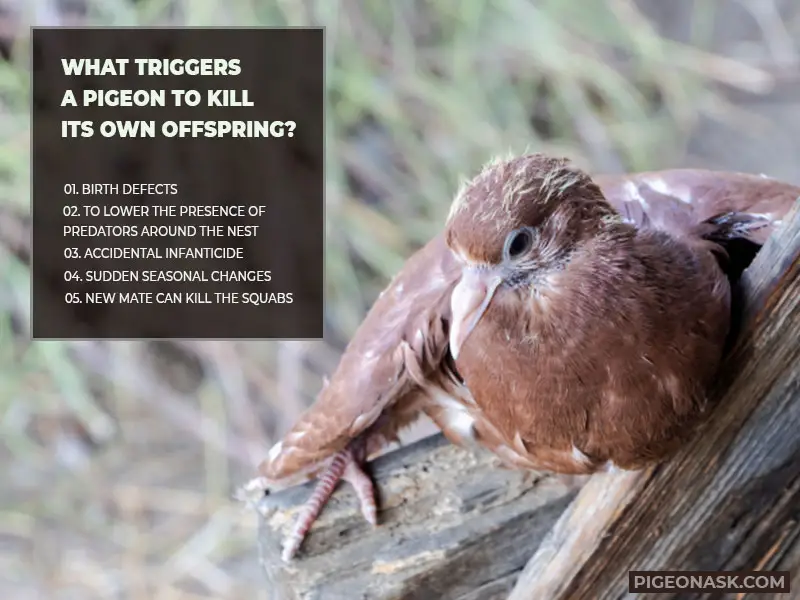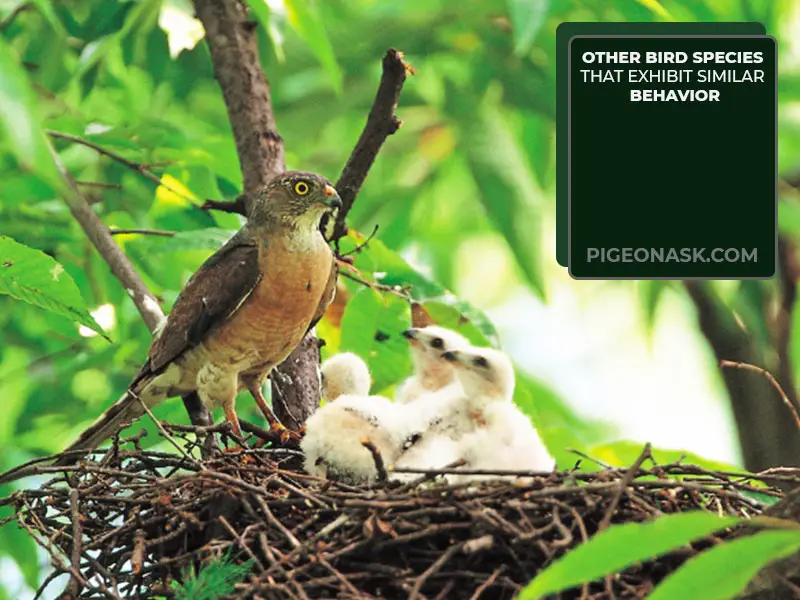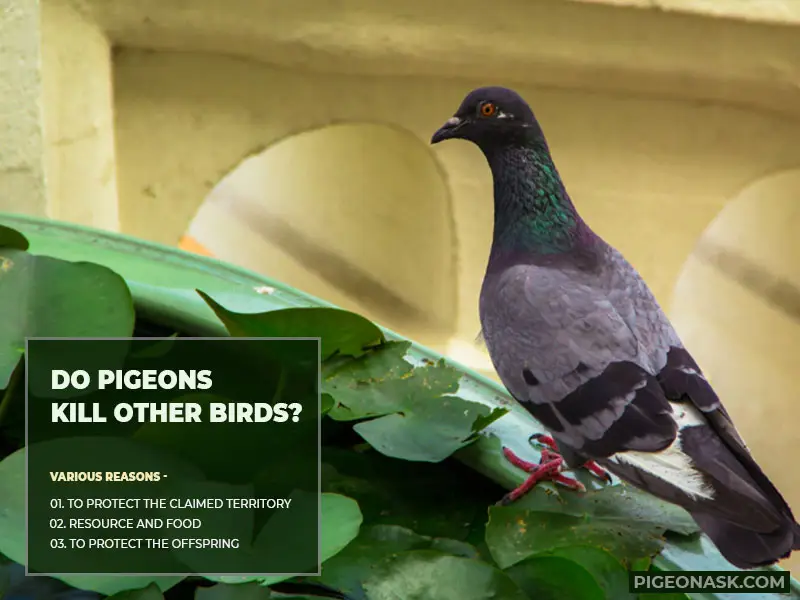Why Do Pigeons Kill Their Babies?
You might not be able to imagine pigeons being violent, but some of their behaviors can be aggressive. And no, it is not just when they are defending their territories. They can even kill their offspring. But why do pigeons kill their babies?
Pigeons can kill their babies when the offsprings are too weak to survive. Feeding these babies is not just a waste of time but also resources. And sometimes, killing one offspring will enhance the chances of survival for the others.
But what things do the pigeons look for before killing their babies? Stick around to get to the bottom of the topic and learn everything about it.
Read more about pigeons behavior:
Do Pigeons Kill Baby Birds?
Pigeons can kill baby birds for several reasons. But if it is not one of their offspring, the adult pigeons will not even think twice before killing the bird. The thing is, pigeons are very territorial. They do not like to share nesting sites with others.

Other than that, pigeons want to ensure that their time and effort output the best result for their offspring. So, when they think one or some of the hatchlings will not make it, the adult birds will kill the babies.
Many things can tell the parents the likelihood of the offspring surviving. And before carrying out an intraspecific aggression act, they will consider them all.
See our in-depth “Pigeon Behavior” article to learn what these urban birds eat. We cover their dietary habits and nutrition.
What Triggers a Pigeon to Kill Its Own Offspring?
Some things let parenrt pigeons decide whether to kill their offspring. Some of them are described below:

Birth Defects
You may not know it, but pigeons are very intelligent. They can have a good perception of danger. And when new babies come out, they can quickly assess whether the baby bird is normal.
If the baby appears to have birth defects, the parents become pretty certain about the chances of its survival. So, instead of wasting time and food on the offspring, they kill it.
To Lower the Presence of Predators Around the Nest
In wild settings, pigeons need to worry about a good number of predators. And even though there might be fewer predators, the threat for pigeons is never zero.
For that reason, when a baby pigeon falls from the nest, parents kill it and throw the baby away. This weak baby pigeon, if returned to the nest, attracts predators. And that eventually increases the risk for the other hatchlings.
Accidental Infanticide
When pigeons breed for the first time, they find it troublesome to take proper care of the squabs. One parent must always be around the newly born birds in the early days. Otherwise, the squabs will not get the heat required to thrive and survive.
But new parents might not know this general rule of thumb. As a result, they might accidentally kill their offspring.
Sudden Seasonal Changes
Pigeons are known for adapting well to challenging conditions. Also, they can breed throughout the whole year. But sometimes, the offspring may hatch when the weather is a bit on the extreme side.
In such cases, instead of letting the squabs suffer, the parents will kill them. This eventually makes things easier for the parents to manage difficult weather conditions.
New Mate Can Kill the Squabs
Yes, pigeons mate for life. But when death approaches one partner, the other finds a new one. And the new partner might not accept the squabs of the previous mate. As you can guess, that can lead to the death of the offspring.
Are There Any Other Bird Species That Exhibit Similar Behavior?
Infanticide or filial cannibalism does not occur just between pigeons. Other birds also exhibit similar behavior. For example, some species of ducks, owls, hawks, and gulls engage in infanticide.

The reasons for the other birds might not be as similar as those of the pigeons. To illustrate, some birds can kill offspring for sexual selection. Male birds can kill male offspring to increase their chances of mating with females.
However, among all the reasons, one common factor influencing infanticide is when the offspring is too weak to survive. Like pigeons, other birds will kill their babies when they have birth defects.
Do Pigeons Kill Other Birds?
Pigeons can attack and eventually kill other birds. And there can be various reasons behind such an aggressive act. For example:
To Protect the Claimed Territory
As mentioned earlier, pigeons are very territorial and do not want other birds to be around their nesting area. So, pigeons can become very aggressive when other birds try to invade.
While the aggressive attack might not be with the intention of killing other birds, things can become quite messy. And eventually, when the other bird can become heavily injured after the fight, causing it to die.

Resource and Food
In both urban and wild settings, pigeons need to compete with other birds to increase their chance of survival. And in some situations, this competition to secure food and resources can end up with one bird getting killed.
To Protect the Offspring
Although pigeons tend to build nests high up, they are always weary of predators. And in breeding seasons, the parents will be on high alert. Any bird that approaches its nesting site will be considered a threat.
Now, when the other birds get too close, the parents will fight to ensure no harm to their squabs. This fighting can lead to the death of the other bird.
How Common Is Pigeon Infanticide?
Pigeon infanticide is very common. Intraspecific aggression and infanticide have been observed among many species of pigeons. However, environmental factors have a significant role in this case.
For example, if the condition suits the offspring, they will not take birth with defects. Likewise, when there is no scarcity of food and resources, pigeons are less likely to kill their offspring.
Final Words
While infanticide might seem cruel, it is a natural behavior of birds that plays a crucial ecological role. So, if you are wondering why pigeons kill their babies, it is for obvious reasons that might not make much sense to us.
Nonetheless, hopefully, you had fun knowing this aggressive side of pigeons. And if you did, you will surely like the posts we have in store for the future. You will not miss them if you stay connected. Here are our Facebook, Twitter, and Pinterest accounts.
Image Credit:
- Canva.com/photos
